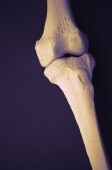
TUESDAY, Dec. 2, 2014 (HealthDay News) — Many men on hormone therapy for prostate cancer aren’t getting bone-strengthening drugs they may need, new Canadian research contends.
Hormone therapy, which suppresses male hormones called androgens, helps stop cancer cells from growing. But one consequence of the treatment is weakening of the bones, which can lead to fractures. To reduce this risk, men can be given oral bisphosphonates, such as Fosamax, or an intravenous treatment once a month or once a year with similar drugs, such as Reclast.
“There seems to be a clear mismatch between Canadian guidelines regarding bisphosphonate usage in men undergoing hormone therapy for prostate cancer and actual clinical practice,” said lead researcher Dr. Shabbir Alibhai, a senior scientist at the University Health Network in Toronto.
While the low rates of bisphosphonate prescriptions may be appropriate for patients who are at low risk for fracture, most men with osteoporosis or other bone conditions should be taking a bisphosphonate, he said.
Why the prescription rate for bisphosphonates is so low isn’t clear, Alibhai said.
“There is a need for further research to discern whether the low prescription rates are due to limited clinician awareness in regards to bone health management, fear at the hands of the patients due to the rare but over publicized serious side effects, pill burden — taking too many medications already — or some other reason entirely,” he said.
Alibhai thinks the same problem exists in the United States. “Based on other studies that have looked at the quality of bone health care in men with prostate cancer, which found similar gaps in the quality of care in the U.S. as we and others found in Ontario, yes, I suspect findings will be similar in the U.S.,” he said.
Fractures are a significant side effect of hormone therapy for prostate cancer and can significantly decrease quality of life and well-being, Alibhai said.
“When patients are starting hormone therapy, or even for patients who have been on it for years, the simplest question a patient can ask their doctor is, ‘How’s my bone health?’ That will start an important conversation about checking one’s bone density, optimizing calcium and vitamin D, stopping smoking, etcetera,” he said.
“And for men who are at high risk of future fracture, medications like bisphosphonates can significantly reduce the risk of fracture, and in these men the risks are almost always outweighed by the benefits,” he added.
The report was published in the Dec. 3 issue of the Journal of the American Medical Association.
For the study, Alibhai and colleagues analyzed bisphosphonate prescriptions among all men aged 66 and older in Ontario receiving hormone therapy for prostate cancer between 1995 and 2012.
“We found that new prescriptions for 35,487 men starting hormone therapy remained low throughout the study period. Even when focusing on those men who should be receiving bisphosphonates as per Canadian guidelines due to their high risk for future fracture, prescription rates remained low,” Alibhai said.
Moreover, new bisphosphonate prescriptions dipped between the 2007-09 and 2010-12 periods. “This may be partly due to recent negative media attention regarding the association of bisphosphonates with rare but potentially serious side effects — loss of blood flow [osteonecrosis] to the jaw and atypical fractures of the thigh bone,” he said.
Dr. Anthony D’Amico, chief of radiation oncology at Brigham and Women’s Hospital in Boston, said the use of bisphosphonates has changed in the United States, making it hard to tell if the prescription rate is low here.
“The use of bisphosphonates has changed dramatically from once a month to once a year,” he said. “Whether or not that was taken into account isn’t clear.”
D’Amico added that bisphosphonates are important for prostate cancer patients, so finding out if they are being underused in the United States is important.
More information
For more information on prostate cancer, visit the American Cancer Society.
Copyright © 2026 HealthDay. All rights reserved.

